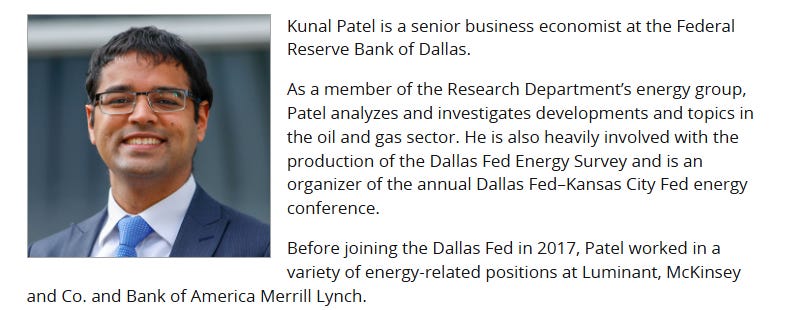Here are the special guests, energy experts and community leaders for This Week In Energy April 12:
Kunal Patel, Dallas Federal Reserve breaks down the recent energy survey with host Jason Spiess. Special questions this quarter include an annual update on break-even prices by basin. Questions also focus on regulatory compliance costs, employee head count, mergers and acquisitions in the upstream sector and the impact of steel import tariffs.
Oil and gas production increased slightly in the first quarter, according to executives at exploration and production firms. The oil production index moved up from 1.1 in the fourth quarter to 5.6 in the first quarter. Meanwhile, the natural gas production index turned positive, rising from -3.5 to 4.8.
Costs increased at a faster pace relative to the prior quarter. Among oilfield services firms, the input cost index advanced, from 23.9 to 30.9. Among E&P firms, the finding and development costs index increased, from 11.5 to 17.1. Meanwhile, the lease operating expenses index rose from 25.6 to 38.7.
The equipment utilization index for oilfield services firms was relatively unchanged at -4.8. The operating margin index decreased from -17.8 to -21.5, indicating margins narrowed at a slightly faster rate. Meanwhile, the prices received for services index swung into positive territory, increasing from -13.0 to 7.1.
The aggregate employment index edged down from 2.2 in the fourth quarter to zero in the first quarter. This suggests employment was unchanged in the quarter. The aggregate employee hours index was relatively unchanged at 0.7. Meanwhile, the aggregate wages and benefits index was also relatively unchanged at 21.6.
On average, respondents expect a West Texas Intermediate (WTI) oil price of $68 per barrel at year-end 2025; responses ranged from $50 to $100 per barrel. When asked about longer-term expectations, respondents on average said they expect a WTI oil price of $74 per barrel two years from now and $82 per barrel five years from now. Survey participants foresee a Henry Hub natural gas price of $3.78 per million British thermal units (MMBtu) at year-end 2025.
When asked about longer-term expectations, respondents on average said they anticipate a Henry Hub gas price of $4.30 per MMBtu two years from now and $4.83 per MMBtu five years from now. For reference, WTI spot prices averaged $67.60 per barrel during the survey collection period, and Henry Hub spot prices averaged $4.10 per MMBtu.
Warren Martin, Kansas Strong, joins Jason Spiess to discuss the realities in the world of oil and gas, sponsoring major sporting events and a couple upcoming projects with PBS and Dennis Quaid.
An upcoming segment of the show 'Viewpoint' with actor Dennis Quaid will feature Warren Martin and Kansas Strong.
Viewpoint with Dennis Quaid airs on PBS is known for “ diving into destinations that offer a unique blend of livability, adventure and opportunity.” According to Martin, the series followed him into a school to record one of his presentation to the elementary students.
“They said that they wanted to talk to me about my innovation of changing the conversation about the oil and gas industry, they recognized our approach and reached out to us about that.” Martin said. “We are talking about the industry in a different way. We're communicating in a different way. We're educating in a different way, and our innovation is not having the same conversation everybody else in the world is having.”
Martin added this is a great opportunity for the industry, especially on a “network that is generally not very positive towards the oil and gas industry”.
“Maybe begin to open some eyes and some ears, that there is a different way to have a conversation about the industry, and so we're excited about that,” Martin said.
Dennis William Quaid is an American actor known for a wide variety of dramatic and comedic roles. First gaining widespread attention in the 1980s, some of his notable credits include Breaking Away (1979), The Right Stuff (1983), The Big Easy (1986), Innerspace (1987), Great Balls of Fire! (1989), Dragonheart (1996), The Parent Trap (1998), Frequency (2000), Traffic (2000), The Rookie (2002), The Day After Tomorrow (2004), Vantage Point (2008), Footloose (2011), Soul Surfer (2011), and The Intruder (2019).
For his role in Far from Heaven (2002), he won the New York Film Critics Circle Award for Best Supporting Actor among other accolades. The Guardian named him one of the best actors never to have received an Academy Award nomination.The goal of the Viewpoint Project is to enlighten the audience by delivering diverse informational and educational documentaries by covering a variety of issues and topics.
Viewpoint Project is on the cutting edge of the television documentary industry, producing top quality programming for Public Television.
The exact air date was not specified.
Dave Roberts, host of the Volts Podcast, digs into the just-released Global Electricity Review from the think tank Ember, with founder Bryony Worthington and lead author Nicolas Fulghum.
“Clean electricity” surpassed 40 percent of global generation in 2024, driven by record solar deployment. The three explore solar's rapid doubling, the pace of demand growth, and the way China's clean energy decisions shape global trends.
David Roberts
So would you venture a guess on what that'll be like next year or two years from now? Like a percent a year? Or are we going to start jumping faster than that?
Nicolas Fulghum
I mean, luckily, we're starting to jump on the faster side of that. So there's a good chance that we'll get about 1 to 2% a year. And then as we go closer to 2030, we'll certainly approach 50% as well, which luckily will give us a lovely headline for one of these iterations of the report.
David Roberts
Yeah, look forward to that one. All right, so I just sort of structured our conversation around the three big megatrends that are identified in the report. One is solar: booming. Hard to miss that one. The second is electricity demand growth. And the third is what are China and India doing? So, I want to talk about all those. Let's start with solar. So, the cool thing that I had not realized, you know, everybody's seen, I think, the kind of Moore's Law or whatever they call it for solar, the cost curve of the cost of solar coming down in a very kind of regular and predictable way.
But what I had not realized is that deployment is doubling on a relatively regular schedule. Talk a little bit about that, like where solar is relative to last year and the year before.
Bryony Worthington
Can I just put that in context? So, as Nick said, you know, there's been this long-term slug of clean power that's been there since the 40s, which is made up of hydropower and nuclear, and you know, they've made up like 25. It's varied, but pretty steady. But what we've seen is this now massive surge in wind and solar in recent years. And the statistic that really stands out for me is that, you know, it took a couple of decades for terawatt hours to reach, you know, 1 terawatt hour of solar and it hit there in 2022, but then it only took two more years for it to hit the next terawatt hour.
So, it doubled in two years. That's where you're starting to see the S-curve of solar starting to impact. And now, Solar's up at 7% of global electricity and it's rising fast and it's a really fast technology to deploy. So, that's where you're going to see the growth.
Click here for the Volts Podcast with Dave Roberts
This Week in Cleantech featuring John Engel and Paul Gerke of Factor This and Tigercomm’s Mike Casey. This week’s episode features Cat Clifford from Cipher News, who wrote about how geothermal energy has emerged as the only renewable source viewed favorably by the Trump administration.
Cat Clifford is Cipher's senior science and economics correspondent, based in New York City. She has been a journalist for almost two decades and for more than half of that time, she has reported on the startup, entrepreneurship and innovation ecosystem. Most recently, she has focused her reporting on the new technology being developed to respond to and mitigate the impacts of climate change.
Before joining Cipher, Cat helped launch the climate desk at CNBC.com, where she was the climate technology and innovation reporter. In that role, Cat was best known for explaining the science behind a new technology or innovation in uncomplicated and precise language. She pairs her rigorous scientific reporting with an uncompromising economic lens, explaining the costs and benefits associated with a new technology or innovation being deployed and potentially operated at scale.
In November, Cat received the Darlene Schmidt Science News Award, given to her by the American Nuclear Society, for her leading coverage of the nuclear industry, both fission and fusion. Other climate technology topics Cat has covered include the burgeoning clean hydrogen economy and related policy, transmission lines and the grid’s importance in the deployment of clean energy resources, the debate over deep sea mining for minerals used in clean energy manufacturing, the development of carbon removal and sequestration technologies, battery technologies and the evolving sentiment around various solar geoengineering strategies, among other topics.
Cat completed the Massachusetts Institute of Technology and Clean Air Task Force's extended education course on nuclear energy in 2021, participated in the Columbia Energy Journalism Initiative in 2022 and was a member of the first cohort of the Climatebase fellowship in 2022. She holds a bachelor's degree from Columbia University.
Joe Sinnott, CEO, Witting Partners, and the host of The Energy Detox Podcast, shares tips on how to keep your leadership skills intact during high stress situations at work and home, especially during mergers and major changes in life.
Navigating Mergers and Acquisitions
M&As are among the most stressful business undertakings, often involving cultural integration, financial risks, and regulatory hurdles[3]. To manage these challenges:
Due Diligence and Preparation: Thoroughly researching potential risks, legal challenges, and financial viability before proceeding.
Clear Communication: Keeping employees, stakeholders, and customers informed to reduce uncertainty.
Retaining Key Talent: Preventing an exodus of essential employees by offering incentives and clarity on future roles.
Overcoming Financial Strains
Economic downturns, cash flow problems, and unexpected costs can place significant stress on business leaders. Strategies to navigate financial turmoil include:
Cost Control and Efficiency: Identifying non-essential expenditures and improving operational efficiency.
Strategic Planning: Developing contingency plans to handle market downturns or revenue shortfalls.
Seeking Expert Advice: Consulting financial advisors or restructuring teams to explore viable options for sustainability.
Personal Stress Management Techniques
Beyond business strategies, executives must also focus on their personal well-being. Methods to manage stress include:
Mindfulness and Meditation: Practicing relaxation techniques to enhance focus and decision-making[2].
Physical Fitness: Engaging in regular exercise to reduce stress hormones and improve overall resilience.
Work-Life Balance: Setting boundaries to avoid burnout and maintain long-term effectiveness.
Executives, business owners, and managers face immense stress, but with the right strategies, they can navigate crises effectively. Whether leading high-risk industries, handling complex business transactions, or managing financial difficulties, a proactive approach to stress management ensures long-term success.
To contact Sinnott, reach out to Joe on LinkedIn or his company website.
Singer Songwriter music feature is the Moody River Band. Click here for their website and music.
All Energy Has A Purpose And We Are All Energy!
This Week In Energy is a weekly newsmagazine radio podcast which qualifies for FCC mandated Public Affairs time. This Week In Energy addresses issues of public interest, such as safety, education, poverty, environment, mental health, and/or employment. Published files and recordings of interviews available as public files to increase accessibility to the public and to ensure the security of information.
Everyday your story is being told by someone. Who is telling your story? Who are you telling your story to?
Email your sustainable story ideas, professional press releases or podcast submissions to thecontentcreationstudios(AT)gmail(DOT)com
This Week In Energy will air across 22 radio stations this weekend and drop on podcast Saturday morning.
CLICK HERE FOR SPECIAL PARAMOUNT + DISCOUNT LINK
Paramount+ offers its subscribers a plethora of quality content.
From instant classic films to banger TV shows like 1883 and Smile 2, there’s no shortage of entertainment to explore.
How about the new series Happy Face? It’s getting fabulous reviews.
Start Streaming Today!




























